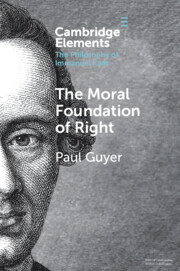Element contents
The Moral Foundation of Right
Published online by Cambridge University Press: 04 December 2024
Summary
- Type
- Element
- Information
- Online ISBN: 9781009464505Publisher: Cambridge University PressPrint publication: 16 January 2025
References
Primary Sources
Secondary Sources
- 3
- Cited by

